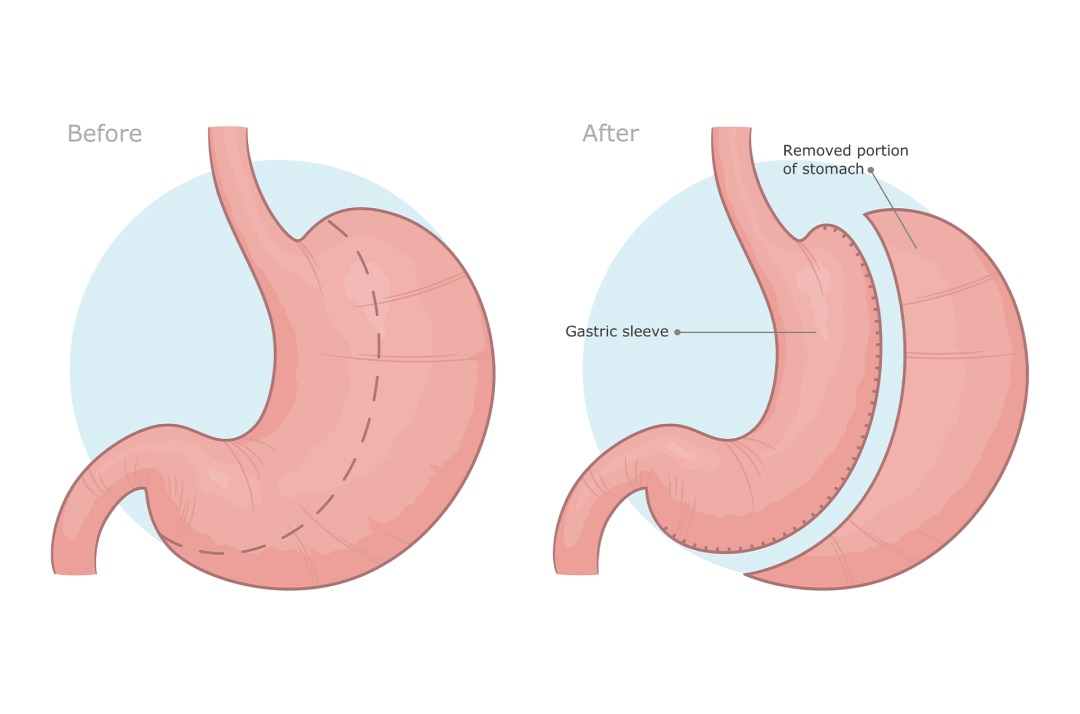Gastric Sleeve Surgery in the UK
Sustainable Weight Loss
You can expect to lose around up to 70% of your excess weight in the first two years after your gastric sleeve operation.
Improve Health Conditions
You can expect improvements in any weight-related conditions that you might have, such as type 2 diabetes, heart disease, osteoarthritis, obstructive sleep apnoea, high blood pressure, and polycystic ovaries. Speak to our team to learn more.
Increased Mobility
Patients find they are able to do more physical activity, which, when paired with lifestyle and diet changes, can lead to an increase in energy, fitness, strength, stamina, bone density, and more.
Hours
Length of Surgery
The gastric sleeve procedure, also known as the sleeve gastrectomy, takes between 1 to 4 hours to perform.
Night
Length of Stay
Patients usually only need one night in the hospital before continuing their gastric sleeve recovery at home. In some circumstances this may extend to two or three.
Weeks
Time Off
Depending on what you do for work, 1 – 2 weeks off is usually required. Full recovery will take place between 6 and 8 weeks.
How will a gastric sleeve help me lose weight?
A sleeve gastrectomy surgery works by reducing the amount of food you can eat. In order to do that, a surgeon will remove between 75-80% of the stomach, leaving a thin, tube-like structure. One of our talented and experienced surgeons will perform the gastric sleeve operation laparoscopically, which means that it’s a keyhole surgery, leaving only a small incision.
A sleeve gastrectomy reduces the production of the hunger hormone, ghrelin, thus changing the way that patients feel hunger and making you feel full faster. This is a restrictive procedure that provides a long term solution to weight loss. Patients will typically see a weight loss of around 70% of their excess weight over a two year period.
We are proud to offer an exceptional team to support you during this exciting time of change. Our patients will receive an aftercare package of nurse and dietetic support.
Gastric Sleeve Surgery
You Can Expect
Up to 70%
Excess Weight Loss
Up to 4 hrs
Surgery Time
1-2 Nights
In Clinic
6-8 Weeks
Recovery Time
2-3 Weeks
Time off Work
Am I suitable?
Find out now
What are the potential risks and complications of gastric sleeve surgery?
As with any surgery, there are potential risks and complications, which your bariatric surgeon will go over with you in as much detail as necessary before proceeding.
Potential risks and complications may include blood clots, infection, internal bleeding, leaking, acid reflux, nausea and vomiting, nutritional deficiencies, stomach ulcers, stricture, adhesion, deep vein thrombosis, pulmonary embolism, infertility, changes in mental health, and weight gain or recurrence of obesity-related illnesses.
Anaesthetic complications can include unexpected reaction to the anaesthetic and chest infection.
The life-changing gastric sleeve lifestyle
After your weight loss surgery, you must implement a healthier lifestyle, including exercise and a healthy diet, adapting your eating habits to promote and maintain weight loss. This is important to maximise the effects of your weight loss surgery and by doing so, you will reduce the risk of weight related comorbidities and post operation complications.
After weight loss surgery, you should increase the amount of fluids that you drink in order to avoid dehydration and constipation. You should also avoid eating and drinking simultaneously in order to reduce the risk of dumping syndrome, which is when food enters the small intestine too quickly. Symptoms can include nausea, vomiting, dizziness, sweating, and diarrhoea. Be sure to follow the advice of your medical team.
Be advised that gastric sleeve surgery changes the way you absorb iron and B12, so you should implement these supplements into your daily routine.
You should avoid getting pregnant for the first 18 months so your weight can stabilise.
To maintain the benefits of your weight loss surgery, you’ll need regular check-ups for the rest of your life, which will become less frequent as time goes on.

What does recovery from a gastric sleeve look like?
You will be able to leave hospital one to two days after your gastric sleeve surgery. It is natural to feel tired afterwards, but depending on your job, you should be able to return to work within one to two weeks after your operation.
You can expect to be driving within four weeks. You should check with your doctor and insurance company first. Typically speaking, you will be able to return to normal daily activity within four to six weeks.
Three to six months after gastric sleeve surgery you may still experience symptoms such as aching, dry skin, fluctuations in mood, hair thinning, feeling cold, and tiredness.
Learn more about the gastric sleeve with Allure
Tailored Aftercare
All Allure weight loss surgery and procedures provide a postoperative support package tailored for you that includes care from dietetic and nursing team. Your dedicated postoperative support team will explain how to manage pain relief medication, discuss the medications you may already be taking for medical conditions related to weight loss, develop a carefully controlled diet plan, an exercise plan, and any blood tests that may be required to monitor your recovery.
Our Team
GMC Registered Consultants
Allure Weightloss takes pride in our CQC registered, industry-leading surgeons who excel bariatric procedures. Learn more about our bariatric consultant surgeons below.
clinics
Gastric Sleeve Clinics
Our independently registered facilities were dutifully selected for their ability to meet our high standards and the needs of our gastric sleeve patients.
Eligibility criteria
- If your body mass index (BMI) is 35 or more and you’ve been struggling to lose weight even while maintaining a healthy lifestyle, this could be an option for you.
- If you have a BMI above 30 and have existing comorbidities, such as sleep apnoea and diabetes, you may still be eligible for gastric sleeve surgery.
- You must be fit for surgery and general anaesthetic to be considered for gastric sleeve surgery.
Sometimes, gastric sleeve surgery is carried out before you can have gastric bypass surgery. You would need to wait for up to 18 months after your gastric sleeve surgery before being assessed for the bypass.
Calculate Your BMI
In order to have gastric sleeve surgery you need a BMI of at least 35. You can use our Calculator in order to determine your BMI, or use the NHS BMI Calculator.
How is body mass index (BMI) measured?
An individuals BMI is calculated by using the following formula:
BMI = Weight (kg) / Height (m)²
You must take your weight in kilograms, divide it by your height in meters, and then divide it a second time by your height in order to determine the correct body mass index.
Not sure you qualify?
If you still aren’t sure, a member of our team will be able to help. If you are certain you won’t qualify for gastric sleeve surgery, you still may be eligible for other medical weight loss treatments.

Ask About Gastric Sleeve Cost, Consultations, and More
If you are interested in a private gastric sleeve, get in touch with the medical weight loss specialists at Allure Weight Loss today. Call , email or fill out our online enquiry form below. We will discuss the gastric sleeve cost, eligibility, and more with you in more detail.
Gastric Sleeve FAQs
You must have a BMI of at least 35. Additionally, you’ll need to be fit for surgery and general anaesthetic.
You won’t be able to eat after your sleeve gastrectomy procedure until you’ve passed the normal swallowing test. After which, you’ll be allowed to eat some soft foods before working with our dieticians to create and maintain a healthy, balanced diet.
On average, people lose 70% of their excess weight from gastric sleeve surgery in the first two years.
After gastric sleeve surgery, your stomach will be reduced from 1500ml to 200ml. A gastric bypass procedure reduces the size of the stomach to 30ml. No matter which weight loss treatment you choose, the weight loss is ultimately up to how you change your lifestyle after surgery.
Gastric sleeve surgery is generally non-reversible. However, if you do not adopt a permanent, healthy lifestyle after the procedure, there is a risk of you reversing your weight loss.
Eating solid foods too soon after your gastric sleeve surgery can create pressure on your stomach pouch and stretch it, this may lead to vomiting and discomfort. To avoid this, you should follow the advice that given to you by your dietitian.
You can drink alcohol after your procedure but the rate at which it is absorbed may have changed. Remember, you will need to adopt a healthy lifestyle after your procedure to successfully lose weight, so keep this into consideration when drinking alcohol. We do not advise drinking alcohol.
Yes, but if you follow the advice from your dietitian and continue to exercise and maintain a healthy lifestyle, then this should not happen.
You may be in hospital for up to two nights following your surgery.
Speak to a patient advisor today to discuss gastric sleeve cost and receive your free quote.
Gastric sleeve patients must stop smoking 6 weeks before their surgery without fail.
Case Studies
Take a look at some of our incredible weightloss success stories

Federica’s Gastric Balloon Journey
Federica lost a fantastic 9.4kg, a total of 12.8% of her starting body weight. Federica was able to use the gastric balloon tool as a way to kickstart a journey that she seeks to maintain with the knowledge she has gained from working with the Allure Dietitian.

Gillian Lost 20.31% of Her Weight with a Gastric Balloon
One of the first questions our team is asked is…

Costas Gastric Balloon Journey
Costas struggled to lose stubborn weight for the last few…

Jennifer Lost 18kg with a Gastric Balloon!
Jennifer, from Chelmsford, lost 18kg with a gastric balloon procedure…






